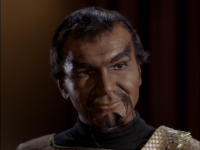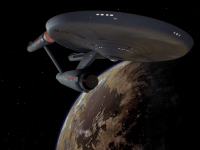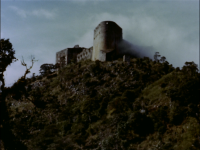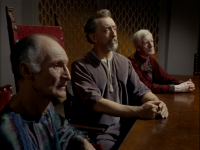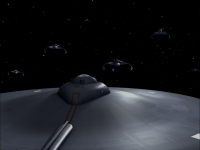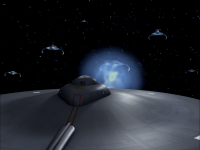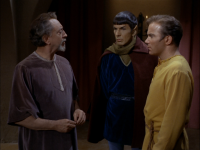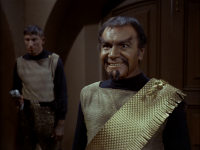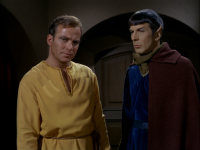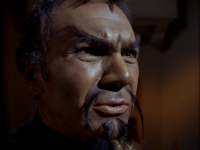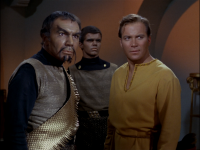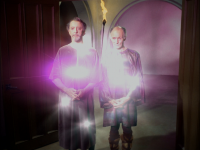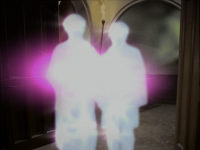Star Trek: The Original Series — 1x26 — Errand of Mercy
Synopsis
Kirk and Spock battle Klingons to free Organia.
Filler rating: not filler
This is the first episode to feature the Klingon Empire.
Remarkable scenes
- The Enterprise being attacked by a Klingon ship and destroying it.
- Kirk describing the horrors of the Klingon Empire to the Organians.
- Kor appearing, taking over the planet, and declaring himself governor.
- Spock passing the lie detector even though he was lying.
- Kirk's private discussion with Kor after Kor discovered Kirk's true identity.
- Kirk: "Gentlemen, I have no great love for you, your planet, your culture. Despite that, Mr. Spock and I are going to go out there and quite probably die in an attempt to show you that there are some things worth dying for."
- Kirk: "What would you say the odds are on our getting out of here?" Spock: "Difficult to be precise, captain. I should say approximately 7824.7 to 1." Kirk: "Difficult to be precise? 7824 to 1?" Spock: "7824.7 to 1." Kirk: "That's a pretty close approximation." Spock: "I endeavor to be accurate." Kirk: "You do quite well."
- Kirk, after infiltrating the Klingon base: "Well, what are the odds now?" Spock: "Less than 7000 to 1, captain. It's remarkable we've gotten this far." Kirk: "Less than 7000 to 1. Well, getting better. Getting better."
- The Organians stopping the fight between the Klingons and the Federation.
- Kirk and Kor arguing with each other, justifying their positions for war.
- The Organians telling Kirk and Kor that in the future the Klingons and The Federation would become friends.
- Kor briefly proposing to work together with Kirk to defeat the Organians.
Review
A proxy war between two large inter-stellar nations which takes place on a (seemingly) backward planet is an intriguing premise for many reasons, not the least of which are the parallels to the many similar proxy fights during the Cold War which doubtlessly inspired this story. It's somewhat annoying that the writers didn't take this opportunity to reuse the excellently characterized Romulan Empire from Balance of Terror, choosing instead to create the never before seen Klingon Empire for this installment's Cold War allegory, but that said, there's no reason why there couldn't be multiple inter-stellar nations battling as cold warriors during Star Trek's 23rd century. Indeed, the Klingon Empire's foreign policy toward the Federation heats up rapidly in this story as after negotiations break down, the Klingons declare war and launch an exciting surprise attack on the Enterprise! Though it wasn't much of an attack. For all that the battle seemed intense at the time, a few (lucky?) shots from Sulu pulverized the surprise Klingon attacker with only trivial damage to the Enterprise.
Thankfully the Klingons are characterized far more successfully the very moment Commander Kor walks onto the screen. The delightful actor John Colicos cultivates an impressive presence for an antagonist not seen since Khan from Space Seed. Kor single handedly exposes us to the Klingon Empire's apparent warrior culture, demonstrating that their ambition for conquest is not merely a means to an end for them, but an end unto itself. This is made most clear when Kor expresses disappointment over his various easy victories in this story, instead preferring a victory that is hard fought and thus, from his perspective, better earned. Even more intriguing is Kor's reverence for the autocracy he lives in. Rather than merely considering it a necessary evil, he instead sees it as the ideal form of government as it rewards the strong at the expense of the weak, an extension of his warrior ideology. This nicely contrasts the crew of the Romulan flagship from Balance of Terror who experienced deep cynicism about their government.
The terrific premise of this story is sullied by a number of imperfections in the story though. For instance, while John Colicos' performance as Kor was excellent, the less said about the other actors playing Klingons the better. Also, why was Sulu placed in command of the Enterprise instead of Scotty? It was established in A Taste of Armageddon that Scotty is the ship's second officer. Was Scotty off the ship at the time? Another wrinkle in the story is the recurrence of the "mysterious aliens slow down the plot" cliche. Once again we have alien guests whose true nature is conspicuously withheld simply to give the plot more time to unfold, as the Organians spend much of the episode saying what basically amounts to, "we have no defenses! Nor do we need them! We're not going to explain why!"
The climax of absurdity here is that their superpowers are revealed about twelve minutes into the story, but Kirk and Spock remain oblivious for a considerable time thereafter despite obvious evidence presenting itself before their eyes. They do wonder how the Organians can know things like the presence of ships in orbit, but do not bother to speculate or consider the possible implications. Though perhaps maybe the reason Kirk and Spock remained so oblivious for so long is because they're soldiers, not diplomats, as Kirk so emphatically stated at one point during the episode. This statement annoyed me because it seems to fly in the face of Star Trek's stated premise which is to peacefully explore the galaxy and to make contact with new civilizations.
Those are minor nitpicks though compared to a few considerably more serious issues with this episode's story. Once again we have an alien race, the Organians, that looks identical to humans and our heroes don't even blink. The profound similarity is even acknowledged in dialog by Kirk and Spock when they admit that Kirk can reasonably pass as an Organian with a mere costume change as if human-looking aliens with no noticeable physical variations are accepted as common throughout the galaxy. If this is indeed the case, I sure would like to know why. Even the Klingons had rather unambitious makeup in this respect. Darker skin and different hair isn't even as creative as the already lazy pointed ears of the Vulcans. As for the Organians, even though it is later established that they could have chosen to appear in any form they wished, the fact that neither Kirk, Spock, nor Kor found the Organians' similarity in appearance to humans conspicuous is most odd. Worse yet, Kirk's orders to establish a base on Organia and share technology with what at the time seemed to be a primitive society would seem to be a blatant violation of the Prime Directive.
But the Organians were indeed more than they appeared to be and while the slow unfolding of this fact by the plot was a bit irritating, it was quite amusing to observe the rather nonchalant way in which they dealt with the invasion of their planet. Perhaps the best part of the story was when the Organians insisted that one day the Klingons and the Federation would become friends and even work together. Given the highly advanced nature of the Organians, we can't simply relegate this statement to the territory of an idle optimistic prediction. On the contrary, they may very well be in a position to know! More importantly though, they may also very well be in a position to influence events in favor of their preferred outcome. They appear to have single handedly stopped the war in this story. Will they prevent further conflict between the Federation and the Klingons?
This question opens up a larger problem that has been slowly climbing its way to the forefront of Star Trek's storytelling which is to what degree do all these god-like aliens actually control the fates of our heroes? Kirk expresses awareness of the conundrum caused by being unambiguously relegated to that of a lesser species in his final lines of the episode when he states that it's unsettling to learn that he and his comrades are not the most powerful beings in the universe. He further expressed dismay that the Organians "rigged the game." Kirk has good reason to express dismay. If the galaxy is truly filled with god-like aliens interfering with the events of the lower planes, then the relevance of our heroes is seriously undermined. At any moment, a deus ex machina can suddenly change the course of their history arbitrarily and for no apparent reason. Let's hope that in the future Star Trek reins in the use of these god-like aliens considerably, or it may become difficult to take the show seriously anymore.
